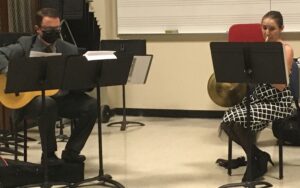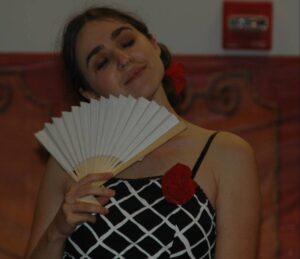Florida Chamber Group Tells Abraham Lincoln Brigade Story Through Music
In December 2021 and January 2022, the South Florida Chamber Ensemble (SFCE) performed Extranjeros, a program about the Spanish Civil War and the Abraham Lincoln Brigade. Written by Myrna Meeroff and produced in partnership with ALBA, the program featured music and texts from Manuel de Falla, María Rodrigo, Joaquín Rodrigo, Federico García Lorca, Joaquín Turina, William Grant Still, and Metallica.
Myrna Meeroff, the SFCE’s executive director, is a French horn player and music educator from Buenos Aires, Argentina, who has performed for audiences all over the world. She currently teaches at Broward College.
Can you briefly describe the show?
In the performance I read a segment of the story and follow it up with a piece of music and speak about the composer of the piece. For example, the second piece on the program is I Dream a World from the opera Troubled Island by William Grant Still. Langston Hughes collaborated with Still on the libretto but left to cover the Spanish Civil War before the piece was finished. I tied each segment to an artist and matched the music with the person. Included in the program is music by Lorca, Turina, Falla and Rodrigo. I pulled in Pablo Neruda through the music of the film Il Postino and Ernest Hemingway through the music of Metallica. It is a very eclectic mix of styles of music, from traditional Spanish to Mexican pop music. The program closes with a slideshow of Lincoln Brigade volunteers who died in Spain. Also, as it turned out, the flamenco guitarist I hired for the show, Nick Mastrovito, is Spanish. His grandmother and mother lived through the Spanish Civil War. When I first signed him on, I had no idea. After each performance I invite him to share his family’s story of the Spanish Civil War. We then open it up for comments from the audience. The discussions have been intelligent, vibrant, and thoughtful.
How did the SFCE come about?
I started the ensemble 11 years ago because I felt very disconnected in the orchestra that I was playing in. Horns sit in the back and basically, from the audience, all you see of me is a space between the first trumpet and the second horn. Musicians were not involved in any of the creative process. My conductor actually asked me once: “Can you do a little less with that phrase?” That was the end for me. I wanted to choose my repertoire and I wanted to connect the music to the world around us in a more meaningful way. With the SFCE, we give around 375 performances a year and every performance is thoughtfully curated. We include a diverse set of composers in every program, including women, Black and indigenous people of color, disabled people, and otherwise marginalized composers. We give detailed program notes from the stage to help make the music accessible to all. Once we played a very avant-garde piece by African American composer Julia Perry based on Poe’s The Cask of the Amontillado. I asked everyone in the audience to channel Poe’s very dark writing and then explained that this story was about a jealous man who kills his rival and buries him behind a brick wall. Rather than having the audience tune out, they listened carefully and were able to hear the story through the very strange sounds coming out of our instruments. We also have a very robust set of educational programs for children and adults that uses music to teach core subjects and promotes listening, memory and reading comprehension skills as well as bringing world culture to our audiences. Last season included Haitian music, Aboriginal Australian song, Afro-Brazilian choros, jazz, and an entire concert dedicated to African American opera. The SFCE brings together all the things that I love: music, other arts, history, social justice, scholarship, and education. For me, it’s a dream job.
What drew you to the Spanish Civil War and the Lincoln Brigade?
The South Florida Chamber Ensemble’s 11th season is called Encounters with Strangers. I wanted to hand off our 10th season, which was about America, to the new season with this concert. When I first approached ALBA about working with me on the project, I really didn’t have a fully fleshed-out concept of what I wanted to do. My original idea had been to write a fictional story about Mussolini’s daughter and Franco’s son trying to resurrect Fascism in Europe. I started doing some research and discovered the Lincoln Brigade. I knew immediately that I wanted to write about that instead. The first thing I did was buy Peter Carroll’s book and I read it cover to cover. He is an incredible writer. I’ve never been so engaged in a work of non-fiction. With that background, the story literally wrote itself. I wanted to tell the story of the Lincoln Brigade through the artists, musicians and composers who were involved so that I could bring music into the story. I also really wanted to have as much historical context as possible. I searched for actual quotes, and I included real people and real situations around a fictional love story between an African American Lincoln Brigade member and a Spanish spy.
Can you tell me about your creative process?
I am inspired by everything around me. Sometimes an idea comes from something I see and sometimes from something I hear. The story I wrote for this project was inspired by the British actor Tobias Menzies. I had the privilege of meeting him in person in 2019 while we were on tour in Europe and the story came to me in my dreams (in which he played Billy the Kid). I find a great deal of inspiration in talking with other creatives. I spend most of my day doing research and this brings a wealth of great ideas and sometimes I am inspired by my students or my kids. Three years ago, we did a MLK Day of Service project and my son came with me. He asked me what this milk day thing was all about. It inspired my most recent project, M(i)LK day—a story about civil rights through the different colors and origins of milks, which opens January 2022 in honor of Dr. King’s birthday.
How did the audience respond to the Spanish Civil War show?
I love every one of my programs—they are like my babies. But this one is particularly close to my heart because I am of Latin American descent, and the music really spoke to me. I was apprehensive at the first show because it took place at Broward College, a community college that is not exactly known for its scholars. Yet the concert was sold out and the audience was engaged in the story, the history and the music. I was mostly surprised by the discussion afterwards. They wanted to know more about Billy the Kid. They wanted to know the names of the composers to listen to more of their music. They wanted to know why the Spanish Civil War isn’t taught in local schools. They wanted to know what living through war is like. (I could share it because I am a refugee from the Dirty War in Argentina.) They stayed to watch the slideshow of the Lincoln Brigade members who perished in Spain.
What was your own experience like?
To be honest, the scariest part of this project was sending my story draft to Peter Carroll for his blessing. I was on pins and needles waiting for his reply. I framed it. I started my artistic career as a writer, writing songs, poems, short stories and novels and I gave it up for music. For many years I have been trying to get back into writing and this first foray has been incredibly positive, so I hope to continue.














